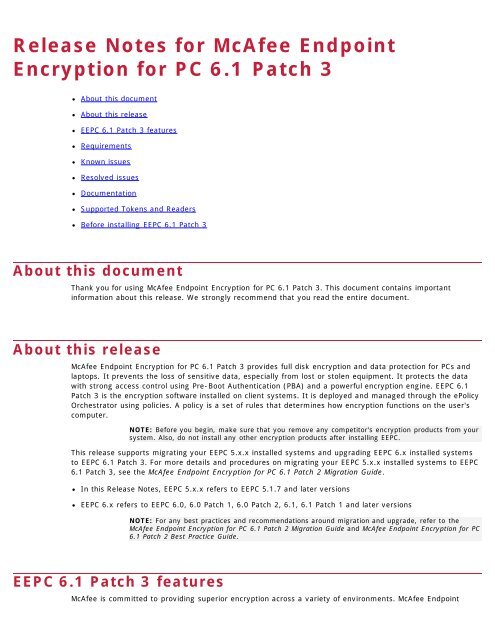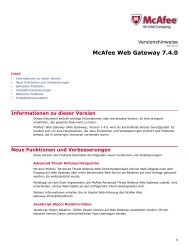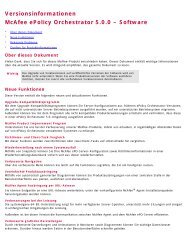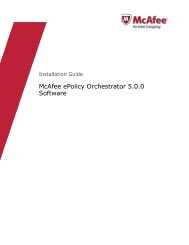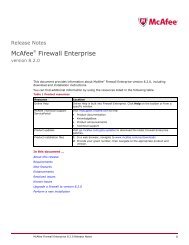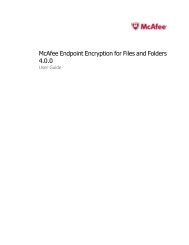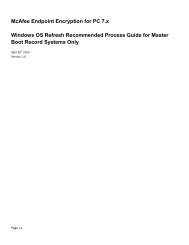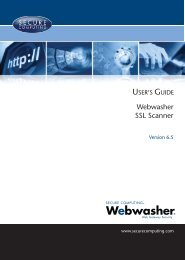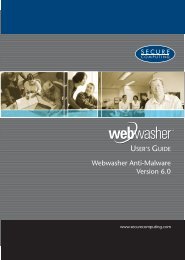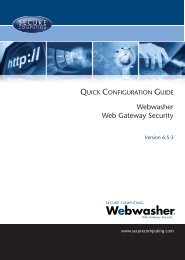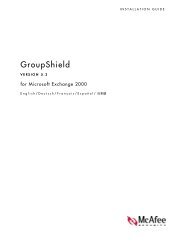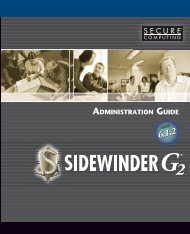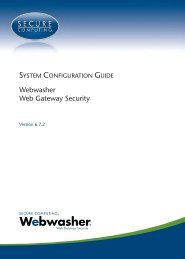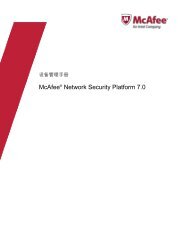Endpoint Encryption for PC 6.1 Patch 3 Release ... - Errors - McAfee
Endpoint Encryption for PC 6.1 Patch 3 Release ... - Errors - McAfee
Endpoint Encryption for PC 6.1 Patch 3 Release ... - Errors - McAfee
You also want an ePaper? Increase the reach of your titles
YUMPU automatically turns print PDFs into web optimized ePapers that Google loves.
<strong>Release</strong> Notes <strong>for</strong> <strong>McAfee</strong> <strong>Endpoint</strong><br />
<strong>Encryption</strong> <strong>for</strong> <strong>PC</strong> <strong>6.1</strong> <strong>Patch</strong> 3<br />
About this document<br />
About this release<br />
EE<strong>PC</strong> <strong>6.1</strong> <strong>Patch</strong> 3 features<br />
Requirements<br />
Known issues<br />
Resolved issues<br />
Documentation<br />
Supported Tokens and Readers<br />
Be<strong>for</strong>e installing EE<strong>PC</strong> <strong>6.1</strong> <strong>Patch</strong> 3<br />
About this document<br />
Thank you <strong>for</strong> using <strong>McAfee</strong> <strong>Endpoint</strong> <strong>Encryption</strong> <strong>for</strong> <strong>PC</strong> <strong>6.1</strong> <strong>Patch</strong> 3. This document contains important<br />
in<strong>for</strong>mation about this release. We strongly recommend that you read the entire document.<br />
About this release<br />
<strong>McAfee</strong> <strong>Endpoint</strong> <strong>Encryption</strong> <strong>for</strong> <strong>PC</strong> <strong>6.1</strong> <strong>Patch</strong> 3 provides full disk encryption and data protection <strong>for</strong> <strong>PC</strong>s and<br />
laptops. It prevents the loss of sensitive data, especially from lost or stolen equipment. It protects the data<br />
with strong access control using Pre-Boot Authentication (PBA) and a powerful encryption engine. EE<strong>PC</strong> <strong>6.1</strong><br />
<strong>Patch</strong> 3 is the encryption software installed on client systems. It is deployed and managed through the ePolicy<br />
Orchestrator using policies. A policy is a set of rules that determines how encryption functions on the user's<br />
computer.<br />
NOTE: Be<strong>for</strong>e you begin, make sure that you remove any competitor's encryption products from your<br />
system. Also, do not install any other encryption products after installing EE<strong>PC</strong>.<br />
This release supports migrating your EE<strong>PC</strong> 5.x.x installed systems and upgrading EE<strong>PC</strong> 6.x installed systems<br />
to EE<strong>PC</strong> <strong>6.1</strong> <strong>Patch</strong> 3. For more details and procedures on migrating your EE<strong>PC</strong> 5.x.x installed systems to EE<strong>PC</strong><br />
<strong>6.1</strong> <strong>Patch</strong> 3, see the <strong>McAfee</strong> <strong>Endpoint</strong> <strong>Encryption</strong> <strong>for</strong> <strong>PC</strong> <strong>6.1</strong> <strong>Patch</strong> 2 Migration Guide.<br />
In this <strong>Release</strong> Notes, EE<strong>PC</strong> 5.x.x refers to EE<strong>PC</strong> 5.1.7 and later versions<br />
EE<strong>PC</strong> 6.x refers to EE<strong>PC</strong> 6.0, 6.0 <strong>Patch</strong> 1, 6.0 <strong>Patch</strong> 2, <strong>6.1</strong>, <strong>6.1</strong> <strong>Patch</strong> 1 and later versions<br />
EE<strong>PC</strong> <strong>6.1</strong> <strong>Patch</strong> 3 features<br />
NOTE: For any best practices and recommendations around migration and upgrade, refer to the<br />
<strong>McAfee</strong> <strong>Endpoint</strong> <strong>Encryption</strong> <strong>for</strong> <strong>PC</strong> <strong>6.1</strong> <strong>Patch</strong> 2 Migration Guide and <strong>McAfee</strong> <strong>Endpoint</strong> <strong>Encryption</strong> <strong>for</strong> <strong>PC</strong><br />
<strong>6.1</strong> <strong>Patch</strong> 2 Best Practice Guide.<br />
<strong>McAfee</strong> is committed to providing superior encryption across a variety of environments. <strong>McAfee</strong> <strong>Endpoint</strong>
<strong>Encryption</strong> <strong>for</strong> <strong>PC</strong> delivers a powerful encryption solution with a strong and unique PBA that protects data from<br />
unauthorized access, loss, and exposure.<br />
Requirements<br />
EE<strong>PC</strong> <strong>6.1</strong> <strong>Patch</strong> 3 integrates itself fully into ePolicy Orchestrator management software so that the<br />
management can now be per<strong>for</strong>med from this console.<br />
EE<strong>PC</strong> <strong>6.1</strong> <strong>Patch</strong> 3 allows the users to extract systems and users from the 5.x.x database, import into<br />
<strong>McAfee</strong> ePO, and migrate the clients to <strong>6.1</strong> <strong>Patch</strong> 3. This particular release supports upgrade from 6.0.x,<br />
<strong>6.1</strong>, and <strong>6.1</strong> <strong>Patch</strong> 1 and 2.<br />
EE<strong>PC</strong> <strong>6.1</strong> <strong>Patch</strong> 3 enables transparent encryption without hindering users or system per<strong>for</strong>mance.<br />
EE<strong>PC</strong> <strong>6.1</strong> <strong>Patch</strong> 3 Supports the use of the Setec smartcard <strong>for</strong> user log on.<br />
With this release, the IBM Tivoli DPRA credentials are no longer filtered and its credentials tiles are<br />
displayed when EE<strong>PC</strong> is installed with EE Logon required/SSO enabled.<br />
The CardOS 4.4 card is supported in this release.<br />
This section provides the requirements <strong>for</strong> the <strong>McAfee</strong> ePO server and EE<strong>PC</strong> <strong>6.1</strong> <strong>Patch</strong> 3 client.<br />
System requirements<br />
Systems Requirements<br />
ePO server systems See the ePolicy Orchestrator product documentation <strong>for</strong><br />
versions 4.5 and 4.6<br />
Client systems<br />
Software requirements<br />
Software Requirements<br />
<strong>McAfee</strong> management software<br />
<strong>Endpoint</strong> <strong>Encryption</strong> <strong>for</strong> <strong>PC</strong> software<br />
Microsoft Windows Installer 3.0<br />
Redistributable package (<strong>for</strong> ePO)<br />
CPU: Pentium III 1GHz or higher<br />
RAM: 256 MB minimum (1 GB recommended)<br />
Hard Disk: 200 MB minimum free disk space<br />
ePolicy Orchestrator 4.5 <strong>Patch</strong> 4 Hotfix 1 and later<br />
<strong>McAfee</strong> Agent <strong>for</strong> Windows 4.5 <strong>Patch</strong> 1 or later<br />
Extensions<br />
EEADMIN.ZIP (<strong>6.1</strong> <strong>Patch</strong> 2)<br />
EE<strong>PC</strong>.ZIP (<strong>6.1</strong> <strong>Patch</strong> 2)<br />
EE<strong>PC</strong> software package<br />
MfeEE<strong>PC</strong>.ZIP (<strong>6.1</strong> <strong>Patch</strong> 3)<br />
EE Agent<br />
MfeEEAgent.ZIP (<strong>6.1</strong> <strong>Patch</strong> 3)<br />
See the ePolicy Orchestrator product documentation <strong>for</strong>
Microsoft .NET Framework 2.0<br />
Redistributable package (<strong>for</strong> ePO)<br />
versions 4.5 and 4.6<br />
See the ePolicy Orchestrator product documentation <strong>for</strong><br />
versions 4.5 and 4.6<br />
Microsoft MSXML 6 (<strong>for</strong> ePO) See the ePolicy Orchestrator product documentation <strong>for</strong><br />
versions 4.5 and 4.6<br />
Operating system requirements<br />
Systems Software<br />
<strong>McAfee</strong> ePO server Systems See the ePolicy Orchestrator product documentation <strong>for</strong><br />
versions 4.5 and 4.6<br />
Client systems<br />
Known issues<br />
Windows Server 2003 SP1 or later (32-bit only)<br />
Windows Server 2008 (32-and 64-bit)<br />
Windows XP Professional SP3 (32-bit only)<br />
Windows Vista (32-and 64-bit)<br />
Windows 7 (32-and 64-bit), (Not XP Mode)<br />
For <strong>McAfee</strong> <strong>Endpoint</strong> <strong>Encryption</strong> <strong>for</strong> <strong>PC</strong> <strong>6.1</strong> <strong>Patch</strong> 3 Known Issues, refer to the KnowledgeBase article<br />
https://kc.mcafee.com/corporate/index?page=content&id=KB73391.<br />
Resolved issues<br />
Issues from previous releases of the EE<strong>PC</strong> that have been fixed in this release are listed as follows:<br />
Some systems with AMD chips display the error message Mcafee <strong>Endpoint</strong> <strong>Encryption</strong> Fatal Error<br />
[0xEE0200006] Getting disk info. (BZ 649912)<br />
Some localized messages are truncated in the EE<strong>PC</strong> Status window. (BZ 681024)<br />
Error writing to disk sector. (BZ 689111, BZ 699440, BZ 709908, BZ 714993 BZ 718394)<br />
Operating system does not load on Dell E6420 computers in RAID ON mode. (BZ 689283)<br />
Support <strong>for</strong> the Alcor smartcard reader is required. (BZ 695037)<br />
<strong>Endpoint</strong> <strong>Encryption</strong> Credential Provider, on a remote desktop, causes Windows Logon issues (hanging)<br />
at the log on screen on Windows 7 64-bit. (BZ 695676)<br />
On Pre-Boot window, the track point does not work on several Lenovo models. (BZ 704555)<br />
Internal smartcard readers do not work on Dell E4200, E6420, E6510 and M4500. (BZ 709021, BZ<br />
705076, BZ 705075, BZ 707900, BZ 705941, BZ 707277)
Documentation<br />
This release of EE<strong>PC</strong> <strong>6.1</strong> <strong>Patch</strong> 3 includes the following documentation set.<br />
Standard product documentation<br />
<strong>McAfee</strong> documentation provides the in<strong>for</strong>mation you need during each phase of product implementation, from<br />
installing a new product to maintaining existing ones. This release of EE<strong>PC</strong> <strong>6.1</strong> <strong>Patch</strong> 3 includes the following<br />
documents:<br />
<strong>McAfee</strong> <strong>Endpoint</strong> <strong>Encryption</strong> <strong>for</strong> <strong>PC</strong> <strong>6.1</strong> <strong>Patch</strong> 3 <strong>Release</strong> Notes<br />
<strong>McAfee</strong> <strong>Endpoint</strong> <strong>Encryption</strong> <strong>for</strong> <strong>PC</strong> <strong>6.1</strong> <strong>Patch</strong> 2 Product Guide<br />
<strong>McAfee</strong> <strong>Endpoint</strong> <strong>Encryption</strong> <strong>for</strong> <strong>PC</strong> <strong>6.1</strong> <strong>Patch</strong> 2 Migration Guide<br />
<strong>McAfee</strong> <strong>Endpoint</strong> <strong>Encryption</strong> <strong>for</strong> <strong>PC</strong> <strong>6.1</strong> <strong>Patch</strong> 2 Best Practice Guide<br />
<strong>McAfee</strong> <strong>Endpoint</strong> <strong>Encryption</strong> <strong>for</strong> <strong>PC</strong> <strong>6.1</strong> <strong>Patch</strong> 2 Quick Start Guide<br />
<strong>McAfee</strong> <strong>Endpoint</strong> <strong>Encryption</strong> <strong>for</strong> <strong>PC</strong> <strong>6.1</strong> <strong>Patch</strong> 2 Scripting Guide<br />
KnowledgeBase article <strong>for</strong> EE<strong>PC</strong> <strong>6.1</strong> <strong>Patch</strong> 3<br />
<strong>McAfee</strong> <strong>Endpoint</strong> <strong>Encryption</strong> versions 5 and 6 Comparison Guide (FAQ) :<br />
https://kc.mcafee.com/corporate/index?page=content&id=KB66700<br />
<strong>McAfee</strong> <strong>Endpoint</strong> <strong>Encryption</strong> <strong>for</strong> <strong>PC</strong> version 6.x Error Messages: https://kc.mcafee.com/corporate/index?<br />
page=content&id=KB67358<br />
<strong>McAfee</strong> <strong>Endpoint</strong> <strong>Encryption</strong> <strong>for</strong> <strong>PC</strong> – Supported Plat<strong>for</strong>ms: https://kc.mcafee.com/corporate/index?<br />
page=content&id=KB68053<br />
Read this be<strong>for</strong>e installing EE<strong>PC</strong>: https://kc.mcafee.com/corporate/index?page=content&id=KB68411<br />
Changes to the <strong>Endpoint</strong> <strong>Encryption</strong> Status tray dialog messages and MfeEpe.log messages between EE<strong>PC</strong><br />
<strong>6.1</strong>/<strong>6.1</strong> <strong>Patch</strong> 1 and <strong>6.1</strong> <strong>Patch</strong> 2: https://kc.mcafee.com/corporate/index?page=content&id=KB72865<br />
How to load the Setec Access Token <strong>for</strong> use with <strong>Endpoint</strong> <strong>Encryption</strong> <strong>for</strong> <strong>PC</strong> <strong>6.1</strong> <strong>Patch</strong> 3:<br />
https://kc.mcafee.com/corporate/index?page=content&id=KB73255<br />
Supported Tokens and Readers<br />
<strong>McAfee</strong> <strong>Endpoint</strong> <strong>Encryption</strong> <strong>for</strong> <strong>PC</strong> supports different logon tokens and token readers. The token type<br />
associated with a user or a user group can be modified using ePolicy Orchestrator. For details on modifying<br />
tokens, refer to the <strong>McAfee</strong> <strong>Endpoint</strong> <strong>Encryption</strong> <strong>for</strong> <strong>PC</strong> <strong>6.1</strong> <strong>Patch</strong> 2 Product Guide.<br />
KnowledgeBase article <strong>for</strong> tokens and readers in EE<strong>PC</strong> <strong>6.1</strong> <strong>Patch</strong> 3<br />
For more in<strong>for</strong>mation about the supported tokens, readers and their known issues, refer to these<br />
KnowledgeBase articles:<br />
<strong>McAfee</strong> <strong>Endpoint</strong> <strong>Encryption</strong> <strong>for</strong> <strong>PC</strong> <strong>6.1</strong> <strong>Patch</strong> 3 Known Issues (Tokens and Readers):<br />
https://kc.mcafee.com/corporate/index?page=content&id=KB71572<br />
Supported Readers used <strong>for</strong> authentication in <strong>McAfee</strong> <strong>Endpoint</strong> <strong>Encryption</strong> <strong>for</strong> <strong>PC</strong> 6.x:<br />
https://kc.mcafee.com/corporate/index?page=content&id=KB71554<br />
Supported Tokens used <strong>for</strong> authentication in <strong>McAfee</strong> <strong>Endpoint</strong> <strong>Encryption</strong> <strong>for</strong> <strong>PC</strong> 6.x:<br />
https://kc.mcafee.com/corporate/index?page=content&id=KB71555<br />
How to use a Stored Value token in <strong>McAfee</strong> <strong>Endpoint</strong> <strong>Encryption</strong> <strong>for</strong> <strong>PC</strong> 6.x:<br />
https://kc.mcafee.com/corporate/index?page=content&id=KB71556<br />
How to use a PKI token in <strong>McAfee</strong> <strong>Endpoint</strong> <strong>Encryption</strong> <strong>for</strong> <strong>PC</strong> 6.x: https://kc.mcafee.com/corporate/index?<br />
page=content&id=KB71557
How to use a Self-Initializing token in <strong>McAfee</strong> <strong>Endpoint</strong> <strong>Encryption</strong> <strong>for</strong> <strong>PC</strong> 6.x:<br />
https://kc.mcafee.com/corporate/index?page=content&id=KB71558<br />
Be<strong>for</strong>e installing EE<strong>PC</strong> <strong>6.1</strong> <strong>Patch</strong> 3<br />
Make sure that you read this section completely and take the following precautions be<strong>for</strong>e installing EE<strong>PC</strong> <strong>6.1</strong><br />
<strong>Patch</strong> 3 on the client.<br />
Hard Disk hardware failure during <strong>Encryption</strong><br />
We recommend running a CHKDSK /r prior to installing EE<strong>PC</strong> to ensure the hard disk is in a healthy state. If<br />
the Hard Disk is damaged or has a high number of undiscovered bad sectors, the disk could fail during the full<br />
disk encryption process.<br />
Be<strong>for</strong>e upgrading to EE<strong>PC</strong> <strong>6.1</strong> <strong>Patch</strong> 3<br />
If you are using the $autoboot$ user id in 5.x.x to boot your systems, without actually having to<br />
authenticate through PBA, then please be advised that the same option is a feature in EE<strong>PC</strong> <strong>6.1</strong> <strong>Patch</strong> 3.<br />
So, make sure that you enable this policy feature (Menu | Policy | Policy Catalog | <strong>Endpoint</strong> <strong>Encryption</strong> 1.1.2 |<br />
Product Settings | Logon | Enable Automatic Booting and Add local domain users) to activate Autoboot while<br />
migrating the users and systems from 5.x.x to EE<strong>PC</strong> <strong>6.1</strong> <strong>Patch</strong> 3. For detailed procedures, see the <strong>McAfee</strong><br />
<strong>Endpoint</strong> <strong>Encryption</strong> <strong>for</strong> <strong>PC</strong> <strong>6.1</strong> <strong>Patch</strong> 2 Best Practice Guide.<br />
Dynamic and RAID disks in Windows XP, Windows 2003, Windows Vista<br />
Because <strong>Endpoint</strong> <strong>Encryption</strong> works at sector level, it does not support software-based dynamic disks as seen<br />
in Windows 2000. The following issues must be considered when installing <strong>Endpoint</strong> <strong>Encryption</strong> on a system<br />
with this feature.<br />
Volumes spanning one or more physical drives<br />
<strong>Endpoint</strong> <strong>Encryption</strong> only encrypts the first drive, which the volume exists on, and leaves the remaining<br />
volumes in plain text.<br />
Volumes mapped as directories (hard links)<br />
<strong>Endpoint</strong> <strong>Encryption</strong> does not encrypt the volume because the physical sectors are not supported at the<br />
BIOS level.<br />
Mirrored and RAID volumes<br />
<strong>Endpoint</strong> <strong>Encryption</strong> is untested in this mode. It is not designed to support software mirroring and RAID.<br />
Hardware RAID<br />
<strong>Endpoint</strong> <strong>Encryption</strong> is untested in this mode, but should work properly in a situation where pure Hardware<br />
RAID has been implemented. However, <strong>Endpoint</strong> <strong>Encryption</strong> cannot support diagnostic or disaster recovery<br />
in this situation.<br />
HP NoteBook <strong>PC</strong>s with SATA hard disks<br />
<strong>McAfee</strong> and HP discovered an issue with the BIOS support of SATA hard disks on HP Notebooks, which makes<br />
writing to the hard disk in SATA Native mode unreliable. The issue has been confirmed on the HP Compaq<br />
nw8440 Mobile Workstation, HP Compaq nc8430 Notebook <strong>PC</strong>, and HP Compaq nx8420 Notebook <strong>PC</strong>.<br />
If SATA Native Mode is enabled on these systems, the following issues eventually occur due to incorrect<br />
writing of data by the HP BIOS:<br />
Corrupt graphics and text pre-boot, missing users, missing tokens<br />
Data Store Corrupt errors<br />
Missing Attribute errors<br />
Unknown User where the user previously functioned and has not been removed.<br />
This issue is present in BIOS versions prior to F.10, released 17th April 2007. In these releases to prevent this<br />
issue occurring, please disable SATA Native Mode in your notebooks BIOS. You can obtain BIOS version F.10<br />
and greater through your HP support service. If you are using a BIOS version of F.10 or greater then this
issue is not relevant. Download the drivers and software from<br />
http://h20000.www2.hp.com/bizsupport/TechSupport/DriverDownload.jsp?<br />
prodNameId=1839208&lang=en&cc=us&taskId=135&prodClassId=-<br />
1&prodTypeId=321957&prodSeriesId=1839152<br />
Time and date synchronization<br />
Make sure that all laptops and systems managed by the <strong>McAfee</strong> ePO server have the same time and date.<br />
General recommendations<br />
If you are using customized themes with EE<strong>PC</strong> 6.0.x, then recreate your custom themes from EE<strong>PC</strong> <strong>6.1</strong><br />
<strong>Patch</strong> 3 default theme after upgrade. This will ensure that EE<strong>PC</strong> <strong>6.1</strong> <strong>Patch</strong> 3 user interface is displayed.<br />
Failure to do so will continue to display the EE<strong>PC</strong> 6.0.x user interface.<br />
NOTE: The size limit of the PNG file that can be uploaded is 2.5 MB.<br />
If you are using Policy Assignment Rules to assign specific <strong>Endpoint</strong> <strong>Encryption</strong> User-Based Policies (UBP)<br />
to users, then refer to the <strong>McAfee</strong> <strong>Endpoint</strong> <strong>Encryption</strong> <strong>for</strong> <strong>PC</strong> <strong>6.1</strong> <strong>Patch</strong> 2 Product Guide to learn how to<br />
configure these users to continue to use Policy Assignment Rules in EE<strong>PC</strong> <strong>6.1</strong> <strong>Patch</strong> 3. This must be done<br />
prior to deploying the EE Agent/<strong>PC</strong> to the clients, failing to configure users correctly will result in users<br />
returning to use the default User-Based Policy assigned at system level.<br />
If you are using the autoboot in EE<strong>PC</strong> 5.x.x, then please be advised that in EE<strong>PC</strong> 6.x, at least one EE<strong>PC</strong> user<br />
must be assigned to each client system <strong>for</strong> the client to be upgraded to EE<strong>PC</strong> <strong>6.1</strong> <strong>Patch</strong> 3 successfully.<br />
After upgrading from 6.0.x to EE<strong>PC</strong> <strong>6.1</strong> <strong>Patch</strong> 3, please run the EE LDAP Synchronization task be<strong>for</strong>e<br />
deploying the EE Agent/<strong>PC</strong> to the clients. EE<strong>PC</strong> <strong>6.1</strong> <strong>Patch</strong> 3 requires additional data to be requested from<br />
the LDAP server <strong>for</strong> users that have been configured <strong>for</strong> User Based Policy en<strong>for</strong>cement.<br />
COPYRIGHT<br />
Copyright © 2011 <strong>McAfee</strong>, Inc. All Rights Reserved.<br />
No part of this publication may be reproduced, transmitted, transcribed, stored in a retrieval system, or<br />
translated into any language in any <strong>for</strong>m or by any means without the written permission of <strong>McAfee</strong>, Inc., or<br />
its suppliers or affiliate companies.<br />
TRADEMARK ATTRIBUTIONS<br />
AVERT, EPO, EPOLICY ORCHESTRATOR, FOUNDSTONE, GROUPSHIELD, INTRUSHIELD, LINUXSHIELD, MAX<br />
(MCAFEE SECURITYALLIANCE EXCHANGE), MCAFEE, NETSHIELD, PORTALSHIELD, PREVENTSYS,<br />
SECURITYALLIANCE, SITEADVISOR, TOTAL PROTECTION, VIRUSSCAN, WEBSHIELD are registered trademarks<br />
or trademarks of <strong>McAfee</strong>, Inc. and/or its affiliates in the US and/or other countries. <strong>McAfee</strong> Red in connection<br />
with security is distinctive of <strong>McAfee</strong> brand products. All other registered and unregistered trademarks herein<br />
are the sole property of their respective owners.<br />
LICENSE INFORMATION<br />
License Agreement<br />
NOTICE TO ALL USERS: CAREFULLY READ THE APPROPRIATE LEGAL AGREEMENT CORRESPONDING TO THE<br />
LICENSE YOU PURCHASED, WHICH SETS FORTH THE GENERAL TERMS AND CONDITIONS FOR THE USE OF<br />
THE LICENSED SOFTWARE. IF YOU DO NOT KNOW WHICH TYPE OF LICENSE YOU HAVE ACQUIRED, PLEASE<br />
CONSULT THE SALES AND OTHER RELATED LICENSE GRANT OR PURCHASE ORDER DOCUMENTS THAT<br />
ACCOMPANY YOUR SOFTWARE PACKAGING OR THAT YOU HAVE RECEIVED SEPARATELY AS PART OF THE<br />
PURCHASE (AS A BOOKLET, A FILE ON THE PRODUCT CD, OR A FILE AVAILABLE ON THE WEBSITE FROM<br />
WHICH YOU DOWNLOADED THE SOFTWARE PACKAGE). IF YOU DO NOT AGREE TO ALL OF THE TERMS SET<br />
FORTH IN THE AGREEMENT, DO NOT INSTALL THE SOFTWARE. IF APPLICABLE, YOU MAY RETURN THE<br />
PRODUCT TO MCAFEE OR THE PLACE OF PURCHASE FOR A FULL REFUND.


